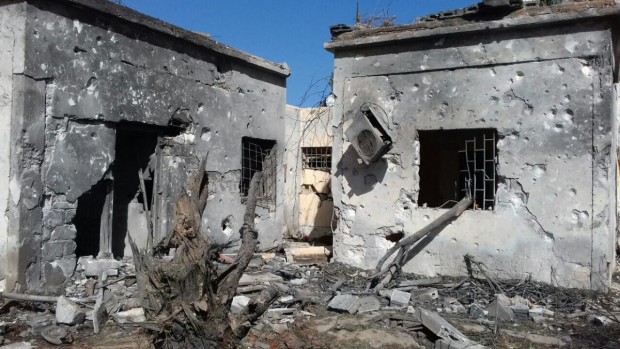Human Rights Watch: Derna airstrikes on February 7th bombed a hospital

Unidentified aircraft attacked a hospital compound in the city of Derna, eastern Libya, on February 7, 2016, in apparent violation of the laws of war. Two bombs struck the Al-Wahda Hospital compound in the Bab Tobruk area, killing at least two civilians, including a child, and causing extensive damage.No warring party in Libya and no third country has claimed responsibility for airstrikes on several locations in Derna that day. Saqr el-Jerroushi, air force chief of staff for the Libyan government based in Tobruk and al-Bayda, which does not control Derna, said in an interview that the strikes were carried out by a “neighboring country” but did not give details. His government, one of two in Libya, also issued a statement denying any responsibility, while warning against the “violation of Libyan sovereignty and penetration of its airspace.”“Libya is in such chaos that unidentified forces are conducting bombing campaigns that kill civilians while those in charge claim not to know anything,” said Hanan Salah, Libya researcher. “Bombing hospitals crosses a red line in any conflict, and demands that those responsible should be identified and held to account.”Human Rights Watch spoke by phone on February 11 with a witness who said that two bombs landed at the Al-Wahda Hospital compound early in the morning on February 7, hitting the kidney and internal medicine sections, as well as the staff dormitory. He said the strikes killed a pharmacy staff member, Mastura Ali Mohamed al-Drissi, 40, and her young son, Mohamed Jomaa Abdelazziz al-Ghwari, 10, who were both asleep in the staff residence.
The witness, a member of the hospital administration, who said no fighters or other members of militias were present in the hospital compound, told Human Rights Watch: “It was very early in the morning, around 5 a.m., when the airstrikes started. I immediately rushed to check on the hospital and found that the kidney section had been badly damaged. Once I got to the staff residence area, I saw the damaged house of one of the families and heard the voice of a man under the rubble calling out for help and asking for his wife and child. Together with others who were assembled at the scene, we dug under the rubble to search for them, the man was fine, but it was too late for his wife and child, they were already dead.”
The witness said two bombs hit a residential area near the hospital compound, wounding an older man praying at Omar Ibn al-Khattab Mosque, also partially damaged, and a child at her home.
Armed conflicts have left the country with two rival governments claiming legitimacy, one based in the cities of al-Bayda and Tobruk in the east, and a rival authority based in Tripoli. Tenuous year-long United Nations-led peace talks resulted in the signing of a political agreement by some factions and individuals, but have yet to lead to the formation of a national unity government.
Derna is controlled by the Derna Mujahideen Shura Council (DMSC), a militant alliance with reported ties to al-Qaeda. The DMSC ousted militants affiliated with the extremist group Islamic State, also known as ISIS, in June 2015, pushing them to the mountainous region around Derna.
Hostilities between the DMSC and ISIS are ongoing, as ISIS fighters frequently attack residential neighborhoods, damaging structures and killing civilians. On February 3, an ISIS sniper firing on a neighborhood in the eastern part of the city killed Miftah Fheim Leissar, 10, who was leaving a mosque with his father, according to a Derna resident.
International humanitarian law, or the laws of war, applies to all sides in the fighting in Libya and prohibits deliberate or indiscriminate attacks against civilians and civilian structures. The laws of war require that the parties to a conflict “take all feasible precautions” to avoid or minimize harm to civilians and damage to civilian objects. Hospitals and medical facilities have special protections under the laws of war. They only lose their protection from attack if they are being used, outside their humanitarian function, for military purposes.
Serious violations of the laws of war, when committed with criminal intent, are war crimes. Those who commit, order, assist, or have command responsibility for war crimes are subject to prosecution by domestic courts or the International Criminal Court, which has jurisdiction over war crimes, crimes against humanity, and genocide committed in Libya since February 15, 2011, under UN Security Council resolution 1970.
Given the impunity for abuses by all sides in the conflict, UN Security Council members should impose sanctions, including travel bans and asset freezes, on individuals responsible for serious crimes as reaffirmed in resolution 2213, adopted in March 2015.
Joint airstrikes by Libyan and Egyptian forces on Derna in February 2015, which resulted in at least seven civilian casualties and damage to civilian structure, remain uninvestigated. Third countries providing direct support to military operations in Libya, such as information on targets, material support, or refueling aircraft, may be parties to the armed conflict and bound to apply the laws of war, including the obligation to investigate alleged violations.“So far the UN Security Council has failed to act on the threats they’ve issued against those who commit serious human rights violations in Libya,” Salah said. “This inaction contributes to the deterioration of the awful situation in Libya, and ordinary civilians are paying the price.”
How to submit an Op-Ed: Libyan Express accepts opinion articles on a wide range of topics. Submissions may be sent to oped@libyanexpress.com. Please include ‘Op-Ed’ in the subject line.
- Libya’s HCS invites applicants for key state roles - December 31, 2023
- UK calls on Iran to prevent escalation in Israel-Hamas conflict - November 05, 2023
- Libyan Interior Minister: Immigrant shelter costs a fortune - November 05, 2023


